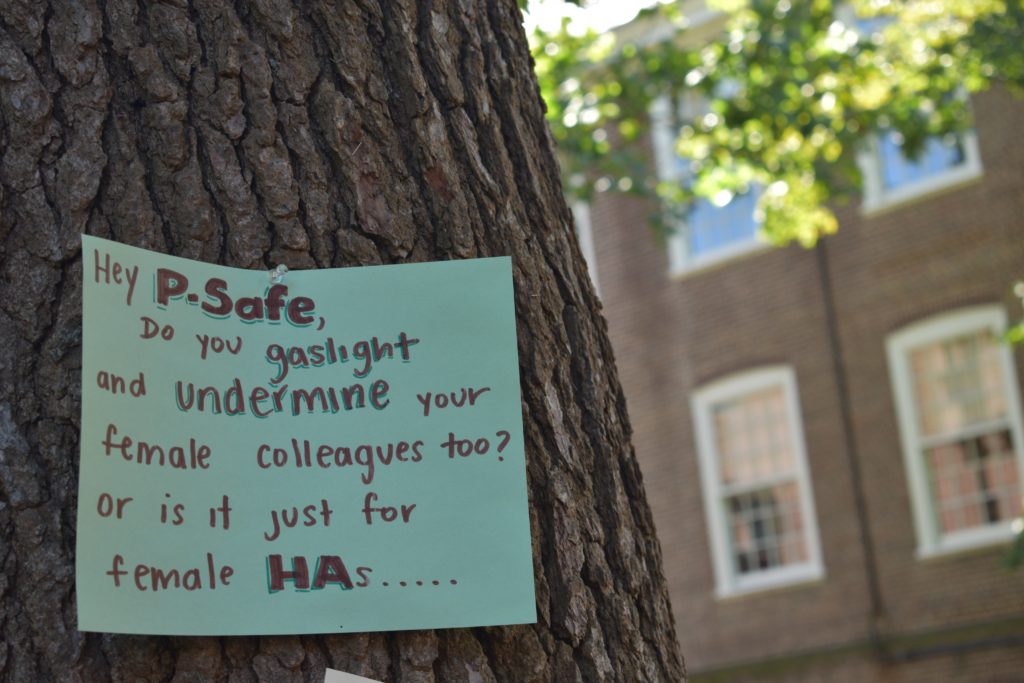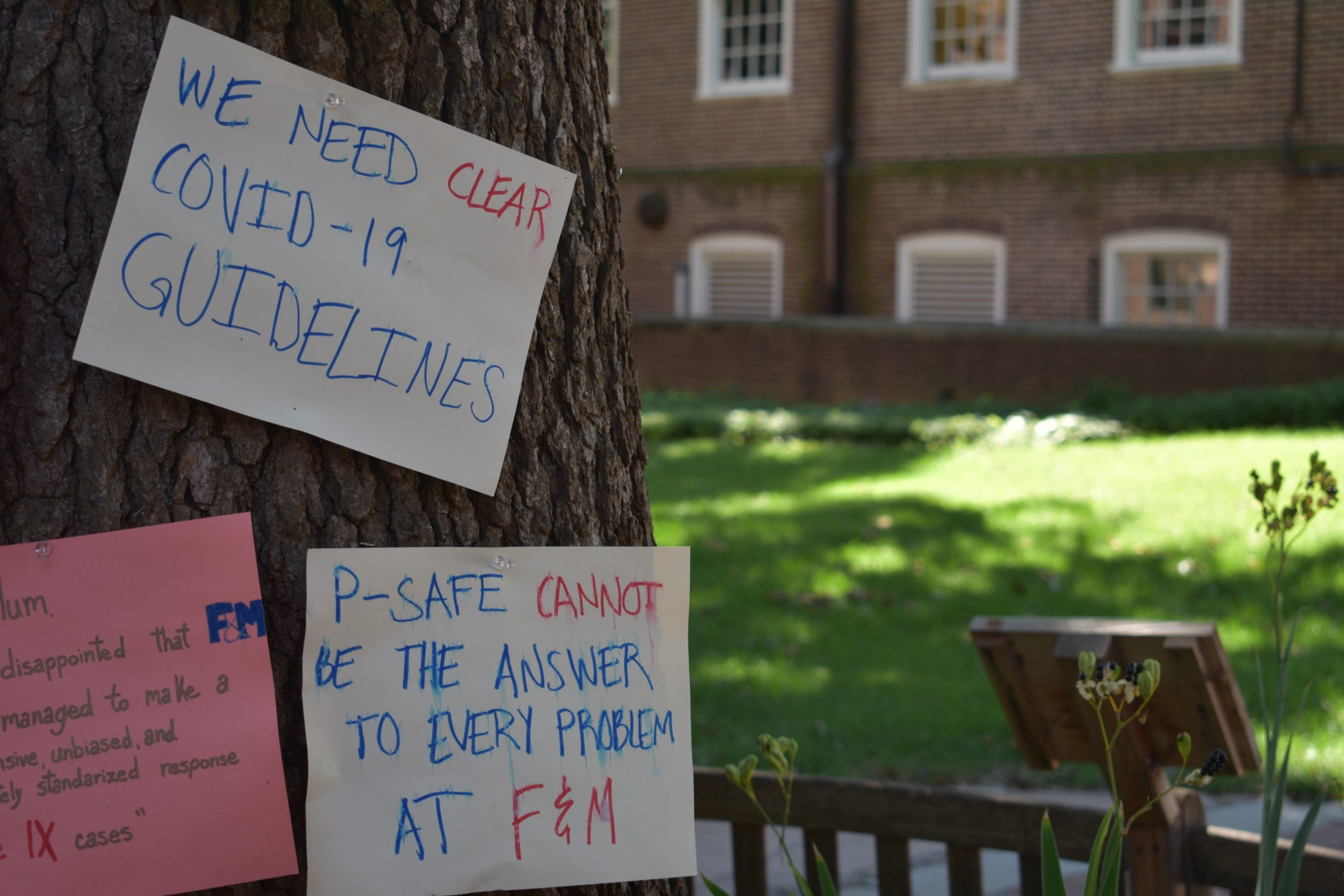By Erin Maxwell || News Editor
Author’s note: All names have been kept anonymous to preserve the privacy of student employees and the security of their jobs.

“We are expected to fill in the gaps the college has left in its support system,” says an HA, sitting down with the formal complaint they had filed in early September. Approved by all college houses’ senior HAs, this complaint was filed officially and unofficially, with a QR code displayed on the protest tree for about a week. In summary, the complaint addresses the failures of PSAFE to treat situations and individuals equitably, the sparseness of Title IX training and resources, the issues with the handling of drugs and alcohol, and the vagueness of the COVID-19 plan and implementation strategy. As they claim these areas are weak, they are left to rise to responsibilities that they are neither trained nor equipped to handle, and, as another HA states, they are “simply tired.”
The biggest concerns HAs expressed were with the PSAFE policies and officers, who they are told at the beginning of the year are “another half of their team.” But, this team is fractured when, as they state in the complaint, PSAFE officers fail to provide adequate backup and equitable treatment in scenarios where HAs are forced to rely upon them. At the beginning of September, an HA reports she and another female HA called PSAFE to break up a large gathering on their floor, about which they had received noise complaints. “People started coming out of the room, clearly intoxicated,” she says, “so as usual, we called PSAFE. From the moment I got on the phone with them, I was spoken to as if I was a nuisance. When they got to the scene, they barely talked to me, and instead assured the boys in the room that ‘they won’t get in trouble with their coaches.’” She expressed that this kind of treatment isn’t new and that she had been warned about it by other HAs. Another HA shares a similar experience and claims that after being belittled by officers in front of her residents, her position of responsible authority was threatened, creating an extremely hostile environment in which residents held resentment against HAs for simply doing their jobs. “I feel like when the female HAs call, we are taken less seriously,” she says. “I heard my resident tell the officers that he was ‘sorry that girl called over this,’ and the officer laughed.”
The problem goes beyond not being taken seriously, they say. Their complaint specifically lists a perceived preference for white male students, particularly, in their experience, athletes. “We share stories pretty often,” an HA says, “and one that sticks out is a time last year, where a PSAFE officer came across an open truck full of hard alcohol belonging to a first-year athlete- instead of doing his job, he laughed and told the student to ‘keep his trunk closed next time.’” Other HAs have similar stories, with one revealing that “PSAFE officers are constantly unmasked on our floor, and joke around with the male students about being maskless,” making her extremely uncomfortable when having to enforce the COVID-19 rules when the enforcers themselves are not following them.
“I guess it’s a symptom of the profession,” another HA says, “but it’s hard to expect them to understand you when they quite literally don’t look like you, or really our student body.” Currently, there is one female PSAFE officer on staff out of 17 officers, and only two of those officers are people of color. Even worse, HAs say, is their lack of DEI training, even after the Black Lives Matter movement and the racial unrest on campus. “Two PSAFE officers told us during our beginning-of-the-year training that they ‘didn’t really understand the whole DEI thing,’” an HA revealed. “They blamed it on growing up in a rural area. What I don’t understand is how PSAFE trains them on DEI, or if they are consistently trained on it at all. It’s unclear how or if they have made any efforts to change.” When PSAFE were reached out to for additional information, according to the authors of the complaint, they were given no details on the DPS training, and any evidence of infrastructural or educational changes to support DEI goals. It seems that some “modules” are available for PSAFE officers to review, but it is unclear whether these modules include any regular instruction, or are purely voluntary. “At the very least, they need training,” another HA said. “We’ve expressed it before, but the lack of transparency is extremely frustrating.” PSAFE was contacted over email several times over the course of two weeks for a response to this article, but no response was provided.

According to the HAs interviewed, the bulk of their training is done before the school year begins and involves primarily team-building strategies and emphasis on weekly “keystone” meetings. However, when faced with a Title IX office staffed by one person, they claim that they are often placed in positions for which they are not equipped. “All they do is give us the number for the Title IX office and the title of ‘mandated reporter.’ We are essentially in charge of a very vulnerable population of first-year students and are given none of the tools for conversations about consent and safety. When we look up the chain of command, the top is empty as well.”
Associate Dean of Students Douglas Adams has heard the complaints and assures those with questions that a forum will be created for them to be heard. In regards to the vagueness of COVID-19 regulations, their implementation, and the enforcement power behind them, many students, and the HAs who are responsible to enforce them, still have questions. In an email, Dean Adams says that PORT will be meeting with HAs to review COVID-19 policies in the near future, reinforcing their responsibility to protect their residents’ safety in the face of what Dean Adams admits are “unique and challenging issues for residential colleges across the college.” Still, many HAs don’t think these promises go far enough. HAs are not allowed to ask their residents about their vaccination status, as per the college’s guidelines that it is “private health information” that would be “inappropriate to share.” Additionally, as they are not taken seriously even when having concerns about underage drinking, HAs do not feel comfortable turning to PSAFE as a COVID-19 enforcement body, and thus feel helpless in combating infractions.
Both PSAFE and other administrators were reached out to for comments but did not respond. Dean Adams asks HAs to first contact their Head HA and supervisors with any concerns, and the Student Employment Office for further support.
Erin Maxwell is a junior and the News Editor for the College Reporter. Her email is emaxwell@fandm.edu.
